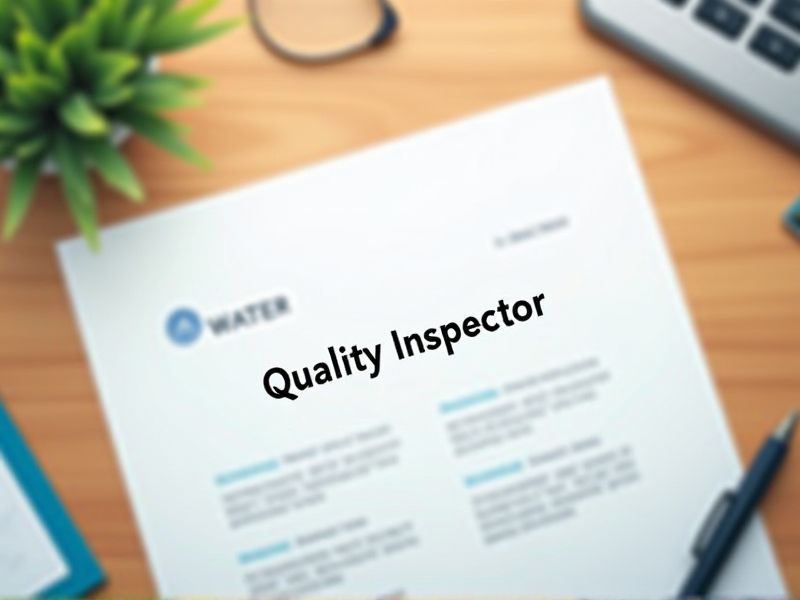
Water quality inspectors play a pivotal role in safeguarding public health and environmental integrity. Due to the complex nature of water systems, inspectors must be equipped with both technical knowledge and regulatory understanding. Certifications ensure that these professionals are proficient in identifying contaminants, assessing infrastructure, and complying with legal standards. Key certifications provide the necessary expertise for a Water Quality Inspector.
AWWA Water Treatment Operator Certification
Obtaining the AWWA Water Treatment Operator Certification ensures that a water quality inspector has a fundamental understanding of water treatment processes, which is crucial for identifying potential issues in water safety. This certification provides inspectors with advanced knowledge on regulations and industry standards, enabling them to effectively assess and advocate for compliance. The structured training associated with the certification enhances skills related to the detection and mitigation of contaminants, directly impacting public health protection. Employers and agencies recognize certified individuals as competent professionals, increasing trust in their evaluations and recommendations.
Certified Water Quality Technician (CWQT)
Certified Water Quality Technicians possess specialized knowledge essential for accurately testing and analyzing water samples, ensuring compliance with safety standards. Their expertise helps in identifying potential contaminants, leading to prompt remediation and prevention of health hazards. Regulatory frameworks often mandate inspections by certified professionals, reinforcing the need for CWQTs to meet legal requirements. Advanced training equips them with skills to operate sophisticated testing equipment, enhancing the reliability of inspection outcomes.
AWWA Distribution System Operator Certification
The AWWA Distribution System Operator Certification ensures that a water quality inspector possesses essential knowledge about water distribution systems, which is critical for maintaining public health standards. Certified operators are required to have a competency in managing and mitigating risks in water distribution that can affect water quality. Regulatory compliance often demands certified professionals, as it indicates a standard of assurance in the inspector's ability to deliver safe drinking water. The certification also reflects up-to-date understanding of the latest industry practices and technologies in water quality management.
Certified Water Specialist (CWS)
A Certified Water Specialist (CWS) possesses specialized knowledge essential for accurately assessing water quality, ensuring safe consumption standards. Their expertise in water treatment technologies aids in identifying and addressing contamination sources effectively. CWS credentials bolster public trust, as they demonstrate a commitment to maintaining stringent water safety regulations. Employing a CWS reduces potential health risks associated with waterborne diseases by ensuring rigorous inspection practices.
EPA Water Sampling and Analysis Certification
Ensuring compliance with the EPA's Water Sampling and Analysis Certification guarantees that water quality inspectors employ standardized methods, leading to consistent and reliable data collection. This certification ensures that inspectors have the essential skills to accurately assess pollutants and contaminants, protecting public health and the environment. Certified inspectors contribute to the identification and control of potential sources of contamination, aiding in regulatory compliance and enforcement. By meeting these certification standards, inspectors help maintain public trust and confidence in water quality management efforts.
Certified Environmental Inspector (CEI)
Water quality monitoring often involves complex regulatory standards, and a Certified Environmental Inspector (CEI) brings expertise in interpreting and complying with these regulations, ensuring sites meet legal requirements. The CEI's specialized training in environmental sciences enables accurate assessment and identification of potential contamination sources, vital for effective water protection. CEIs are skilled in employing advanced testing methodologies, which supports the early detection of pollutants, mitigating adverse impacts on ecosystems. Involving a CEI in water quality inspection enhances credibility and maintains public trust by demonstrating commitment to environmental stewardship and safety.
Certified Laboratory Analyst (CLA)
A Certified Laboratory Analyst ensures accurate analysis of water samples, which directly influences the reliability of water quality assessments. Their certification signifies proficiency in laboratory techniques, reducing the risk of errors that could lead to misinformed decisions about water safety. They stay abreast of industry standards, enabling them to implement up-to-date methods for detecting contaminants. Their expertise supports the regulatory compliance of water quality inspections, ensuring that public health guidelines are consistently met.
ASQ Certified Quality Inspector (CQI)
The ASQ Certified Quality Inspector (CQI) certification equips water quality inspectors with the necessary skills to conduct thorough quality assessments and inspections. It ensures that inspectors possess knowledge of proper quality control methods, enabling them to detect potential contaminants effectively. Certified inspectors demonstrate a standardized level of competence, which can strengthen public trust in water safety. This certification helps maintain consistent water quality monitoring protocols, reducing discrepancies that might lead to environmental or health issues.
OSHA Water Operations Safety Certification
The OSHA Water Operations Safety Certification equips water quality inspectors with necessary safety protocols, reducing workplace accidents. Certification ensures inspectors are knowledgeable about handling hazardous materials, safeguarding both health and the environment. By understanding regulatory compliance, inspectors can effectively navigate legal requirements, protecting both themselves and public interests. Certification also enhances efficiency, leading to more accurate inspection outcomes and improved water quality.
Certified Industrial Hygienist (CIH)
Water quality inspectors need expertise in identifying potential health hazards, which a Certified Industrial Hygienist (CIH) provides through training in environmental and occupational health principles. The CIH's specialized skills help interpret complex data related to water contaminants, ensuring compliance with health and safety standards. When unexpected chemical releases impact water sources, the CIH's knowledge is critical for risk assessment and mitigation strategies. Collaboration with a CIH facilitates the development of effective water management plans that prevent adverse health outcomes for communities.
Summary
With certifications, you can enhance your credibility and trustworthiness as a water quality inspector. Certified inspectors often achieve higher job satisfaction and career advancement opportunities. Your skills in identifying and resolving water quality issues become more refined and efficient. Certification may lead to improved public health outcomes and community trust in water safety.
